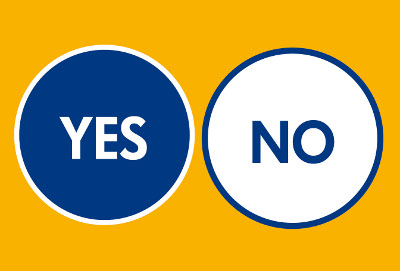 As the date for the referendum on Scottish independence arrives, Mark Fairweather-Tall considers the lasting consequences of the vote and looks at what the Bible says about Godly decision making.
As the date for the referendum on Scottish independence arrives, Mark Fairweather-Tall considers the lasting consequences of the vote and looks at what the Bible says about Godly decision making.
According to the polls at this time, it is too close to call which way the vote will go. One thing is for sure, though, it is a big decision and will have lasting consequences.
It was May 1st 1707 that Scotland and England came together to form a political union called the Kingdom of Great Britain. Political union with Ireland followed in 1801, creating the United Kingdom of Great Britain and Ireland. Towards the end of the last millennium things began to change as a new Scottish Parliament was elected with the power to make a number of decisions previously made at Westminster. The next step could see Scotland severing its current links with England, Wales and Northern Ireland and there is no doubt that the debate has fired great passions with strong disagreements.
Much has been made of the economic issues: There is the question of currency and whether an independent Scotland would be able to keep the pound and what the alternative might be? What will happen to the UK’s national debt and how much will an independent Scotland be liable for? Then there is oil – will oil revenues help to make an independent Scotland a rich country in the long term or is there a risk in over-relying on something that will eventually run out?
Then there are the political issues: An independent Scotland would get the government they voted for rather than being ruled from Westminster. It would allow the country to make their own decisions on issues such as the ‘bedroom tax’, minimum wage levels, green issues and so on. However, others point to the increased security that comes from being a united Kingdom in internationally turbulent times. And so these and other arguments go backwards and forwards. Whilst many have made their decision, others are still weighing up which way to vote.
Let me state clearly at this point: I am not Scottish, I live in England and I am not writing this article from a ‘yes’ or a ‘no’ perspective. I simply recognise that this is a big decision with far reaching consequences that can only be guessed at and not fully known. And that resonates with me because there are times when I have to make the sort of decisions that will impact for a number of years my way of life or the direction of a community I am part of. As a Christian I want to do God’s will and walk in His ways. However, I recognise that it is easy to state that desire but often much harder to discern what the will of God actually is.
In Proverbs, we read: “Trust in the Lord with all your heart and lean not on your own understanding; in all your ways acknowledge him, and he will make your paths straight.” (Proverbs 3:5-6) It is an encouraging verse that makes it sound possible – I can make Godly decisions and walk the path He wants me to if I look for Him in everything I do, trust Him and don’t simply rely on what I think I know. Again, though, that sounds good, but what does it look like in reality? Here are a few thoughts that I find both helpful and challenging in my desire to make Godly decisions…
1) Trust in the Lord with all your heart…
Naturally prayer is going to be an essential part of what we do and it is vital we affirm to God that we want to walk in His ways and make a decision that honours Him. We need to acknowledge that we trust the Lord with all our heart. The word ‘heart’ in the Bible refers to the whole person and their attributes – physical, intellectual and psychological. So for example, in Proverbs 16:23 it says: “A wise man’s heart guides his mouth...” The heart is the essence of who you are – it is revealed through how you think; why you speak and act in certain ways. We see our heart revealed through our will, volition and emotional reactions to different events. So when we hear the words “Trust the Lord with all your heart”, it is saying “Trust the Lord in all your thinking, all your speaking, all your actions.” So we need to bring before God not just the decision we have to make but rather the whole of our lives. We can reflect on our thinking, speaking and actions to consider whether they suggest we are trusting God completely.
2) And lean not on your own understanding…
In Jeremiah 17:9, we read: “The heart is deceitful above all things and beyond cure. Who can understand it?” This is why we have to be so careful about leaning on our own understanding because we can so easily deceive ourselves. There is a spiritual discipline that we need in prayer when it comes to making important decisions – perhaps I can call it ‘stillness of heart and mind’. We need to try and put to one side our own natural wants and desires to focus completely on what God wants. It can be too easy to convince ourselves that we are thinking clearly and following God’s will when the truth might be different. Honest discussion with a trusted and mature Christian can be a tremendous gift and help towards discernment. It is an essential capacity to relinquish our own understanding as we strive towards finding the heart of God. It is only when we do this that we are in a position to follow His paths and perhaps even echo the words of Christ: “Not my will, but yours be done.”
3) In all your ways acknowledge him…
What does it mean to acknowledge God? Well, there are many things that could be said but how about these for a challenging couple of questions to reflect on: Is my decision based on what is best for me or for others? Is my decision based on avoiding a short term cost at the expense of the long term benefit?
At the heart of the Christian faith is the cross where Jesus died. In the Garden of Gethsemane, we read of the anguish of Jesus as he looked at the decision he had to make. How could he decide to walk the path of obedience to death on the cross? An important part of that answer is that firstly Jesus didn’t make a decision on what was best for himself but the benefit it would have for others; secondly, he was willing to pay a short term cost for the long term gain.
Decision making so often can be complicated by the issue of doing what is best for me as opposed to what might be best for others. It can be harder still when there is a short term cost for a longer term gain. The example of Jesus is of putting the welfare of others before his own and an eternal perspective above short-termism. Perhaps a part of acknowledging him might well be to do likewise and we can reflect whether the decisions we are making do this.
4) And He will make your paths straight
Very often as it comes to the time of making a decision I change the way I pray. Early on in the process I pray that God will reveal His will and that I will walk on his path. Near the end as the time comes to make a concrete decision, I pray along the lines of: “Lord, I want to walk in your path and be faithful to you. Having sought your will, I believe this is the course of action I should take. If I am wrong, please make it clear to me before I go along this path…”
Human frailty means that we will still get some of our decision making wrong. But He makes our paths straight through the forgiveness we receive through Jesus. We get to have a fresh start with Him and walk new paths. There may be consequences to face from wrong decisions but we don’t face them alone.
And to return to Scotland for a moment… I pray that they make a wise decision and whatever the result, I pray for their future that God’s Kingdom will be seen and will grow, regardless of whether Scotland is a part of the United Kingdom or not.
 Rev Mark Fairweather Tall is the Minister of Norwich Central Baptist Church.
The views carried here are those of the author, not of Network Norwich and Norfolk, and are intended to stimulate constructive debate between website users.
Rev Mark Fairweather Tall is the Minister of Norwich Central Baptist Church.
The views carried here are those of the author, not of Network Norwich and Norfolk, and are intended to stimulate constructive debate between website users.
We welcome your thoughts and comments, posted below, upon the ideas expressed here.
Click here to read our forum and comment posting guidelines.